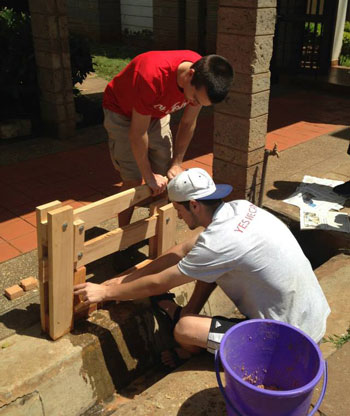Entrepreneurs in training
Students seek to create lasting business ventures in developing countries
March 19, 2014
By Elisabeth Leipholtz '15

Dan Anfinson (red shirt) and Dan Hammerseng-Nelson work on a BioMass Press.
Chicken coops, pig pens and BioMass Presses - oh my.
Square One, formally known as the Uganda Project, is a group of CSB and SJU students seeking to create lasting micro-business ventures in developing countries in Africa. They have completed three projects in the past three years.
This year's project was to deliver BioMass Presses — a simple machine that recycles organic waste into a briquette, which can then be used and sold as a cheaper, more eco-friendly alternative to coal — to students in Kenya. In 2013, the group built a pig pen and in 2012, two chicken coops — both at Hope Academy in Kyetume, Uganda.
"After the students (from the first two projects) came back from Uganda, we decided that we needed to change the name because we wanted to expand (out of Uganda)," CSB junior Alex Latanision said. "That's how the Uganda Project formed into Square One."
The concept of Square One was born from the Entrepreneur Scholars program at CSB and SJU, which provides students the opportunity to design and implement business ventures. Square One is made up of about 16 students. The group that worked on the BioMass Presses was comprised of six students - Colleen Kennedy, who graduated after fall semester; seniors Dan Anfinson and Amy Olsen; and juniors John Moore, Dan Hammerseng-Nelson and Latanision.
"We had already done two projects in Uganda," Square One President Andrew Mueller said. "There are a lot of challenges with sustaining projects, and we knew that if we did another in the same place, they might not be able to handle it until they started seeing some results from the first two businesses."
However, the group did not want to take a year off completely. After conducting some research, they decided to expand out of Uganda and travel to Nairobi, Kenya, home of the Mathare slum - one of the biggest in the world. Volunteers from the Benedictine Volunteer Corps, a Saint John's Abbey program, work at St. Benedict's Center in Nairobi, which works to transition boys from the streets to school.
The group left for Nairobi on Dec. 27 and spent 12 days there. Over 700,000 people live in the Mathare slum — in a space roughly the size of Seattle geographically. More than 86 percent of Mathare's population lives without running water, sewage systems, electricity, roads or adequate housing. The hope is that the briquettes produced by the BioMass presses will be used by the students for electricity and also sold for profit.
In addition to implementing the BioMass Presses, the team worked with children from St. Benedict's Center (also known as Madodo). The center currently sponsors about 130 boys, meaning the school pays for most of their school expenses including tuition, travel and uniforms.
"This is why we need to return to Madodo next year, to help them expand the BioMass business," Latanision said. "We hope to return with a business plan in order to spend time educating them about the logistics involved with starting a business that has an international target market."
St. Benedict's Center also offers a day program which essentially serves as a rehabilitation program designed to allow boys from the slums to re-enter the school system. The program typically serves 15-20 boys at a time.
"Square One saw this partnership as the key to addressing the enormous needs of the community," Latanision said. "The volunteers recruit motivated and entrepreneurial boys in the slums that they believe will have potential. Madodo is a safe place for boys in the slums to hang out and focus on their schoolwork."
Matt Dummer and Anthony Origer (both SJU class of '13) are currently volunteering with the Benedictine Volunteer Corps at St. Benedict's Center, and served as the connection between the institution and Square One.
"This institution, just like many others in Kenya, runs exclusively on donations from foreigners," Dummer said. "It creates a dependency syndrome that can be very problematic, so initiating endeavors like this one (BioMass Presses) could be a very valuable way of starting to end this process."
After leaving Nairobi on Jan. 8, the group (with the exception of Latanision, who left early for a semester in London), traveled to Hope Academy. While there, they reevaluated the previous projects - the chicken coops and the pig pen.
"Both are still standing, working and functioning," Mueller said. "The biggest problem with the chickens has been disease-related - getting sick and dying. The pigs haven't had major hiccups yet."
"We also ran a four-day youth camp on entrepreneurship and leadership while there," Hammerseng-Nelson said. "We pretty much just made sure that things were still moving along well there...that was the reevaluation phase in order to see if we could go back and start another project the following year."
In order to fund the trip and the project, Square One held fundraisers at local businesses, contacted friends and family for support and sold Hope Beads, made by women in Uganda where previous groups had worked. They raised approximately $25,000.
In the future, Square One hopes to expand out of Africa, possibly to Central America, and also hopes to perhaps expand to other colleges and universities.
"There's a lot of opportunity for this project in the future," Mueller said. "Entrepreneur Scholars is a program where a project can really turn into something amazing. Another hope is that it doesn't just stay on campus, and that other colleges begin to follow our model and we can help them start their own projects globally so that maybe someday Square One is a national nonprofit organization with a lot of students working on projects."
